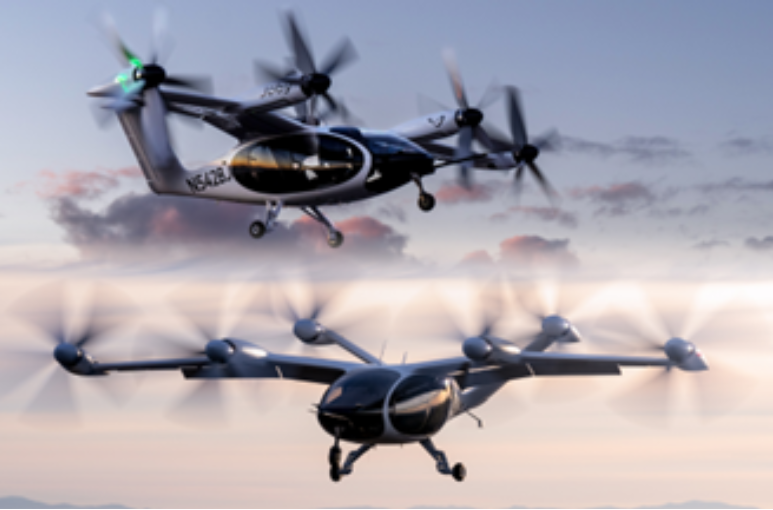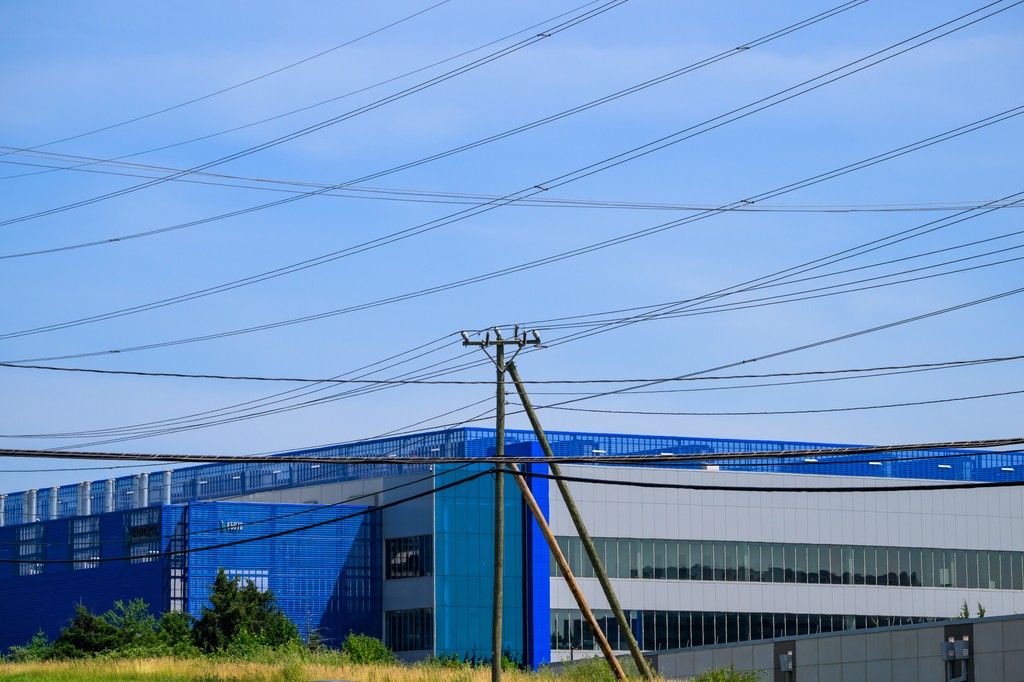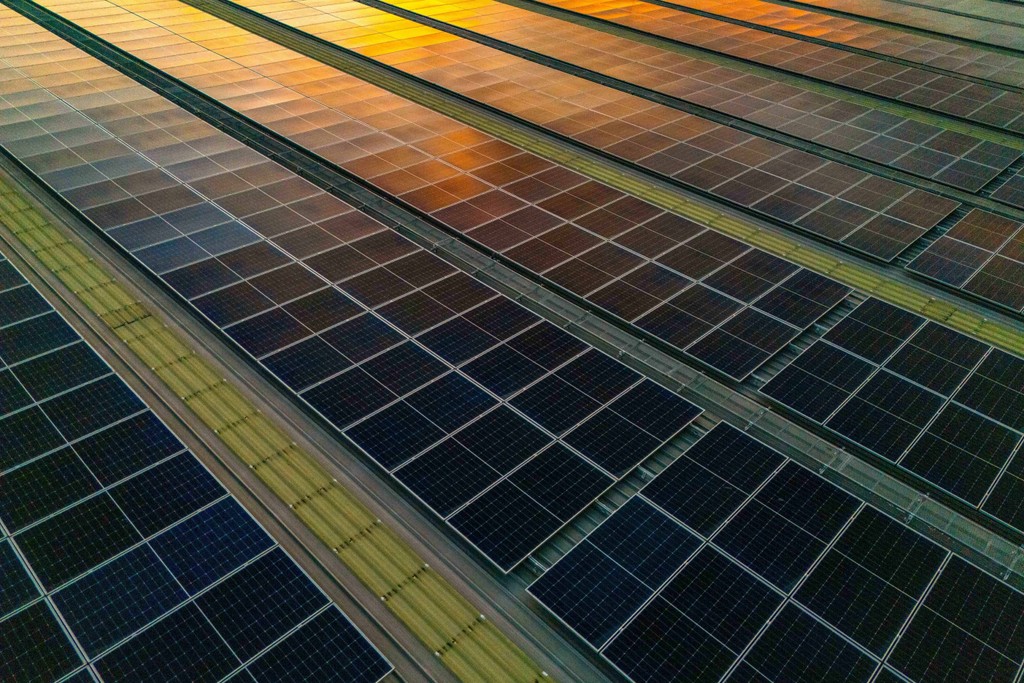By Vandana Gombar, Senior Editor, BloombergNEF
Leaving New York often starts with the long slog out to JFK. Joby Aviation wants to change that and says it is set to launch its electric air taxi service next year at a price that is comparable to a conventional premium cab.
A trip will be cost competitive with the Uber Black service initially, and will become “an increasingly more affordable service,” JoeBen Bevirt, founder and chief executive officer of Joby, told BloombergNEF.

“We have had continued significant interest from both strategic partners and financial investors to be part of this next generation of transportation.” –
JoeBen Bevirt, Founder and CEO
The California-headquartered company manufactures the electric vertical takeoff and landing, or eVTOL, aircraft – capable of carrying four passengers in addition to the pilot – and will run the service. The initial rides will likely take passengers from the center of New York or Los Angeles to the airport. Today, an Uber Black car from Midtown Manhattan to JFK will cost around $200.
Speed will be the big selling point. “A flight in a Joby aircraft from a downtown Manhattan heliport to JFK will take approximately seven minutes, compared to around 50-75 minutes by car,” Bevirt said.
Joby has raised more than $2 billion, with Toyota, Intel and Delta Air Lines among the key investors. At the end of the first quarter, Joby had $924 million in cash and short term investments, according to its latest update.
The company is seeing continuing interest from automotive, aviation and real estate companies, Bevirt says. “Real estate is the world’s largest global asset class, and it is all about location, location, location. With eVTOLs, you can move seamlessly from one location to another,” he said.
The first aircraft was manufactured a year ago and delivered to the Department of Defense, and the firm aims to manufacture one aircraft a month by the end of the year, ramping up production to reach more than one a day ultimately.
Bevirt says the electric aircraft can have a lower carbon footprint than a battery powered car: “Ideally our target is to have lower grams of CO2 equivalent per passenger kilometer (or mile) – on a lifecycle basis – than riding an electric car on the ground, and yet you are able to get to your destination more than five times faster.”
Ultimately, the firm wants to develop self-driven electric air taxis, also referred to as an autonomous eVTOL, but that’s some way off. “We believe the quickest way to bring eVTOL flights to the public is with a piloted aircraft, as currently, regulatory agencies don’t have a path to certify fully-autonomous aircraft. However, autonomous aircraft are a possible evolution,” he said.
When do you launch a commercial service, where, and at what scale?
We have three paths to service launch: two on the commercial side and one with the US Department of Defense. On the commercial side, we have been working with our partner Delta Air Lines to prepare for commercial operations in a number of their top markets, including New York and LA. We’ll be working with them at airports like JFK, LaGuardia and LAX to deliver a best-in-class experience for their customers, connecting them seamlessly onto Joby flights, or on to their final destinations.
The second path on the commercial side is in markets outside the US. For example, as part of our partnership with Dubai’s Road and Transport Authority, we’ve been granted a six-year exclusive license to operate air taxis in Dubai.
The third path involves our longstanding partnership with the Department of Defense, which dates back to 2016. Our current and previously completed work with the DoD represents a total potential contract value of $163 million – the largest in the industry. We delivered our first aircraft to the US Air Force last year at Edwards Air Force Base, which will be used for on-base operations and logistics testing, with a second aircraft expected to join it later this year. We recently committed another two aircraft to MacDill Air Force Base.

The exciting thing about your service is the competitive pricing. Will it be equal to a shared Uber ride ultimately?
Our target is that this becomes an increasingly more affordable service over time. Part of that progression is being cost competitive with Uber Black initially and moving down and becoming competitive with other taxi services. We will get you to your destination significantly faster at a competitive price point. There are multiple elements that make it possible. When you are moving on the ground, you are constrained by 2D [two-dimensional] infrastructure that results in routes that are less direct. The average speed of ground transportation tends to be 20 miles an hour. You can move in the air at 200 miles an hour. Both the aircraft and pilot are able to deliver more passenger miles in a given amount of time. That is the metric that matters for us – how many passenger miles can we deliver each hour. The more passenger miles we are able to deliver, the more cost effectively we are able to deliver them.
When do you plan to reach 100 aircraft per year manufacturing capacity?
We began flying the first prototype in full scale in 2017, with the first production version of that aircraft coming off our manufacturing line about a year ago. We are ramping up the line with the goal of reaching one aircraft a month by the end of the year.
We also have a production line in Dayton, Ohio with the goal of being able to produce up to 500 aircraft a year over time.
We are in the early stages of our progression – moving from pilot manufacturing to phase 1 manufacturing where we are able to build hundreds of aircraft per year. We look at this being analogous to the early days of the automotive industry. Automobiles went from being hand-built – 1 or 10 of a given model per year – to hundreds per year, and then thousands. Today we build nearly 100 million automobiles per year worldwide. eVTOLs will see progressive scaling as well, and that is one of the reasons you are seeing the world’s leading automobile companies leaning into this sector. As you know, Toyota is one of our largest investors, and it has been incredible to have Toyota engineers working shoulder to shoulder with the Joby team since 2019.
We will take a measured approach to ramping production, as we dial in our processes here in California first and then expand to grow production capacity in Ohio.
When do you see the need for additional funding, and what will be the route to mobilize that?
We have raised more than $2 billion to date, and we have had continued significant interest from both strategic partners and financial investors to be part of this next generation of transportation. We’re grateful to have partners like Toyota, which is not only our manufacturing partner but our largest external shareholder, and support from Baillie Gifford, a long-term investor in Joby since 2020. As we expand the business, there may be opportunities to bring in additional partners. We see significant interest from the automotive side, from the aviation side and also from the real estate side. Real estate is the world’s largest global asset class, and it is all about location, location location. With eVTOLs, all of a sudden, you can move seamlessly from one location to another. I think we are going to see interest from real estate operators accelerate over the next few years.
BNEF clients can access the full interview here.






